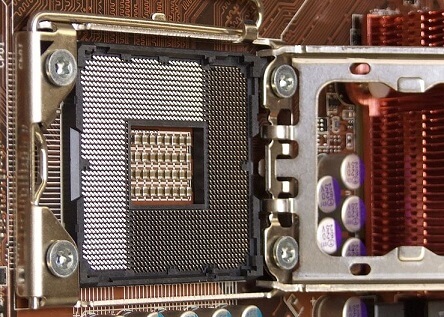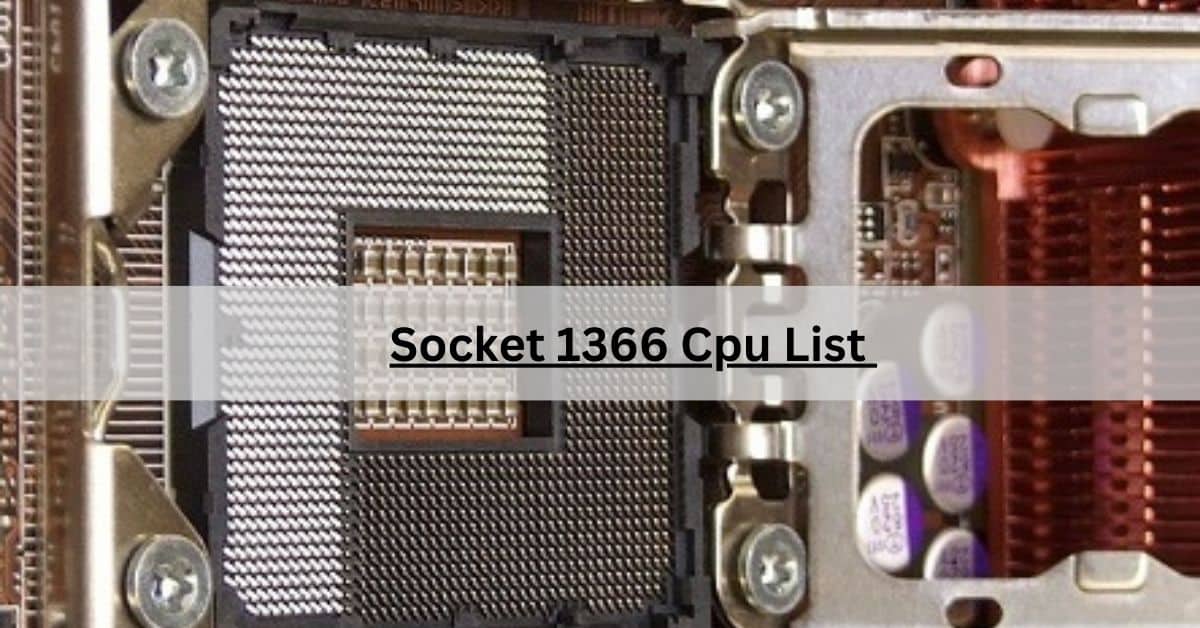When I was upgrading my gaming rig, I discovered the Socket 1366 CPU list, which opened up a world of high-performance processors. I found gems like the Intel Core i7-980X, perfect for handling demanding tasks and gaming at high settings.
The Socket 1366 CPU list showcases high-performance processors, including the Intel Core i7-980X and i7-975, ideal for gaming and demanding computing tasks.
Stay tuned as we dive into the world of Socket 1366 CPUs! We’ll explore the top processors on the list, discuss their features, and share insights on how they can elevate your computing experience. Don’t miss out—join us for all the details on these powerful processors!
What Is the Socket 1366 CPU List?
The Socket 1366 CPU list includes a selection of high-performance processors designed by Intel for use in desktop computers. Introduced in 2008, this socket supports a range of CPUs, primarily from the Intel Core i7 series. These processors are known for their strong performance, making them suitable for tasks like gaming, video editing, and other demanding applications.

Some of the most notable CPUs in the Socket 1366 list include the Intel Core i7-980X, i7-975, and i7-960. Each of these processors features multiple cores and threads, which allows them to handle multiple tasks at once efficiently. Whether you’re looking to upgrade an older system or build a new one, understanding the Socket 1366 CPU list can help you choose the right processor for your needs.
Read More: Can You Flash Bios With Cpu Installed – Find Out Now!
Which Processors Are Included in the Socket 1366 CPU List?
The Socket 1366 CPU list includes several powerful processors from Intel’s Core i7 family. Some of the most popular models are the Intel Core i7-980X, which features six cores and is great for multitasking, and the Intel Core i7-975, known for its high clock speeds. Other notable processors in this list are the Intel Core i7-960 and i7-950, both offering solid performance for gaming and heavy applications.
What Are the Key Features of Socket 1366 CPUs?
Socket 1366 CPUs are known for their impressive features that make them suitable for high-performance computing. One key feature is their support for multiple cores, with some processors like the Intel Core i7-980X having up to six cores, which allows for better multitasking and faster processing. They also support Intel’s Hyper-Threading technology, enabling each core to handle two threads at once, further boosting performance.
Can I Use Socket 1366 CPUs for Gaming?
Yes, you can use Socket 1366 CPUs for gaming, and many gamers have successfully done so. Processors like the Intel Core i7-980X and i7-975 provide strong performance, thanks to their multiple cores and high clock speeds. They can handle modern games well, especially when paired with a good graphics card.
How Does Socket 1366 Compare to Other CPU Sockets?
When comparing Socket 1366 to other CPU sockets, several key factors come into play:
1. Performance:
Socket 1366 CPUs, particularly the Intel Core i7 series, deliver strong performance for multitasking and gaming. However, newer sockets like LGA 1151 or LGA 1200 offer improved architectures and higher clock speeds, resulting in better overall performance in modern applications.
2. Core Count:
Many Socket 1366 processors, such as the i7-980X, feature six cores and support for Hyper-Threading, which allows them to handle 12 threads simultaneously. In contrast, newer sockets may support more cores and threads, providing even better multitasking capabilities.
3. Memory Support:
Socket 1366 supports triple-channel DDR3 memory, offering good bandwidth for memory-intensive tasks. Newer sockets typically support faster DDR4 or DDR5 memory, which can further enhance performance and speed.
4. Compatibility:
Socket 1366 is specifically designed for Intel CPUs, while other sockets like AM4 are compatible with AMD processors. This means that users need to choose their motherboard and CPU carefully based on their preferred brand.
5. Longevity:
Socket 1366 was popular in its time but has become outdated compared to newer sockets that support the latest technologies and processors. If you’re building a new system, opting for a more recent socket can provide better future-proofing.
6. Price and Availability:
As Socket 1366 is an older platform, the CPUs and compatible motherboards may be more affordable compared to the latest options. However, newer sockets may offer better value for performance in the long run, especially for gaming and heavy workloads.
What Motherboards Are Compatible with Socket 1366 CPUs?
Motherboards compatible with Socket 1366 CPUs are specifically designed to support Intel’s Core i7 series processors. Some popular motherboard models include the ASUS P6X58D, Gigabyte GA-X58A-UD3R, and MSI X58 Pro. These motherboards often come with features like multiple PCIe slots for graphics cards.
When selecting a motherboard for a Socket 1366 CPU, it’s important to consider the features you need, such as the number of RAM slots, type of expansion slots, and available ports. Ensure that the motherboard has the latest BIOS updates to support all features of your chosen CPU.
How Do I Choose the Best CPU from the Socket 1366 List?
To choose the best CPU from the Socket 1366 list, start by considering your specific needs and budget. Look for processors with higher clock speeds and more cores if you plan to use demanding applications or play modern games. For example, the Intel Core i7-980X is an excellent choice for performance due to its six cores and high speeds. Also, check the thermal design power (TDP) rating to ensure your cooling system can handle the CPU’s heat.
Are Socket 1366 CPUs Still Relevant in 2024?
As of 2024, Socket 1366 CPUs are considered outdated but can still be relevant for specific uses. While they offer solid performance for basic tasks and some gaming, newer CPU sockets provide significantly better speed, more cores, and improved energy efficiency. If you’re on a tight budget or looking to upgrade an older system without spending too much, a Socket 1366 CPU can still perform adequately for everyday tasks.
What Is the Maximum RAM Supported by Socket 1366 CPUs?
Socket 1366 CPUs can support a maximum of 24GB of RAM when using triple-channel memory configuration. This means you can install up to six RAM sticks of 4GB each, taking advantage of the motherboard’s ability to use three memory channels simultaneously. This setup allows for better memory performance, especially in tasks that require a lot of memory, like video editing or gaming.

However, it’s important to note that not all motherboards will support the full 24GB. Some may only allow for 12GB or 18GB, depending on their design and specifications. Therefore, when building or upgrading a system with a Socket 1366 CPU, be sure to check the motherboard’s documentation to understand the maximum RAM it can handle and to ensure you get the most out of your setup.
Read More: Why Is My Cpu Overclocking Itself – Common Causes &
Can Socket 1366 CPUs Be Overclocked?
Yes, Socket 1366 CPUs can be overclocked, which means you can run them at higher speeds than their standard settings to improve performance. Many users overclock models like the Intel Core i7-980X to gain extra power for gaming or heavy applications. To overclock successfully, you’ll need a good motherboard that supports overclocking features, as well as effective cooling to manage the additional heat generated.
FAQs:
1. What Cooling Solutions Work Best for Socket 1366 Processors?
Socket 1366 processors benefit from high-quality cooling solutions, such as tower coolers or liquid cooling systems. These options help maintain optimal temperatures during heavy workloads or overclocking, ensuring stable performance.
2. What Is the Power Requirement for Socket 1366 CPUs?
The power requirements for Socket 1366 CPUs vary by model, with most requiring a power supply of at least 95 to 130 watts. It’s essential to use a reliable power supply that can handle the CPU’s needs, especially when overclocking.
3. How Do I Identify If My CPU Is a Socket 1366?
You can identify a Socket 1366 CPU by checking the model number printed on the processor itself or by using system information tools on your computer. Look for Intel Core i7 models like 950, 960, 975, or 980X, which all use the Socket 1366 interface.
4. What Is the Average Lifespan of a Socket 1366 CPU?
The average lifespan of a Socket 1366 CPU can range from 5 to 10 years, depending on usage and maintenance. Regular cleaning, proper cooling, and avoiding overclocking can extend the lifespan of the processor.
5. Can I Upgrade My Socket 1366 System Easily?
Upgrading a Socket 1366 system can be challenging, as this platform is outdated. You may need to replace the motherboard and CPU to accommodate newer technology, which could require a complete system overhaul.
Conclusion:
Socket 1366 CPUs offer a mix of performance and reliability for users looking to upgrade older systems or build budget-friendly setups. While these processors are no longer at the forefront of technology, they can still handle everyday tasks and some gaming effectively.
However, if you’re aiming for the best performance in modern applications, investing in newer CPU sockets may be more beneficial in the long run.
